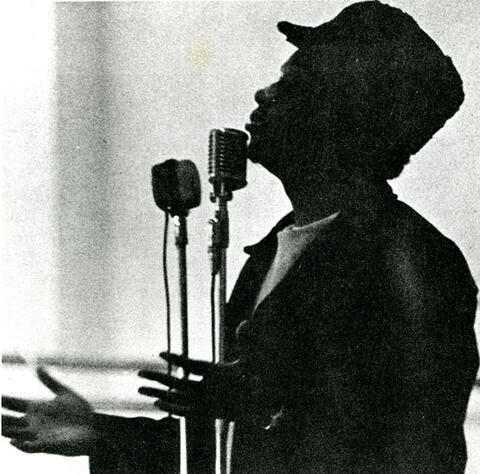
Área de título y declaración de responsabilidad
Título apropiado
Black Panthers - Fred Hampton
Tipo general de material
- Graphic material
Título paralelo
Otra información de título
Título declaración de responsabilidad
Título notas
Nivel de descripción
Item
Institución archivística
Código de referencia
Área de edición
Declaración de edición
Declaración de responsabilidad de edición
Área de detalles específicos de la clase de material
Mención de la escala (cartográfica)
Mención de proyección (cartográfica)
Mención de coordenadas (cartográfica)
Mención de la escala (arquitectónica)
Jurisdicción de emisión y denominación (filatélico)
Área de fechas de creación
Fecha(s)
-
1969 (Criação)
Área de descripción física
Descripción física
1 negative : b&w ; 10.16 x 12.7 cm
Área de series editoriales
Título apropiado de las series del editor
Títulos paralelos de serie editorial
Otra información de título de las series editoriales
Declaración de responsabilidad relativa a las series editoriales
Numeración dentro de la serie editorial
Nota en las series editoriales
Área de descripción del archivo
Nombre del productor
Historial de custodia
Alcance y contenido
Reproduction of a photograph of Fred Hampton, a Black Panther group member who spoke on campus, that appeared in the 14 Nov. 1969 vol. 59 no 24 edition of The Sheaf.
Bio/Historical Note: On 17 November 1969, three members of the Illinois chapter of the Black Panthers addressed four separate campus audiences during a tour of western Canadian universities. Their stop in Saskatoon was cut short a few days later with the deportation of two of the three. A week later the most dynamic of the speakers, Fred Hampton, was dead - shot to death in his bed by Chicago police. Formed in 1966 by chairman Bobby Seals, the Marxist-Leninist Black Panthers advocated the use of violence to obtain political goals. Rapid growth, accelerating violence, and calls for the overthrow of the government, by 1969 had brought the Panthers into a protracted and violent struggle with the American authorities. The U of S, like other Canadian and American universities, had become increasingly radicalized during the late sixties. The visit by the Panthers was but one in a parade of militant protest groups that addressed campus audiences. The three Panthers outlined the party's ten-point program and emphasized their peace-loving nature, assuring those present that they were not fighting the whites, but people, white and black, who were reactionary. When questioned about the party's policy on violence, Fred Hampton, deputy minister of information, said: "if a man kicks our door down then we'll blow his brains out. If he doesn't want his brains blown out then he'll knock on the door." Accusations levelled by Saskatchewan Attorney-General Darrell Heald that the Panthers were stirring up sedition among Indigenous people precipitated an investigation by immigration authorities. It was found that two of the three were travelling under false papers. The third, Fred Hampton, left Canada voluntarily. Hampton's death a week later would not have surprised the twenty-one year old who had stated flatly while in Saskatoon, "Panthers never live to retirement age." Judas and the Black Messiah is a 2021 American biographical drama film about the betrayal of Hampton by William O'Neal, an FBI informant.

